-
 Bitcoin
Bitcoin $86,250.6982
1.63% -
 Ethereum
Ethereum $1,890.1026
-0.98% -
 Tether USDt
Tether USDt $1.0000
0.01% -
 XRP
XRP $2.1367
0.29% -
 BNB
BNB $603.5934
-0.76% -
 Solana
Solana $129.4201
2.45% -
 USDC
USDC $1.0000
0.00% -
 Dogecoin
Dogecoin $0.1724
0.45% -
 Cardano
Cardano $0.6839
0.62% -
 TRON
TRON $0.2381
0.57% -
 Toncoin
Toncoin $3.9840
-0.47% -
 Chainlink
Chainlink $13.8431
-2.30% -
 UNUS SED LEO
UNUS SED LEO $9.3956
0.41% -
 Stellar
Stellar $0.2705
-1.46% -
 Avalanche
Avalanche $19.2650
-0.80% -
 Sui
Sui $2.4309
0.03% -
 Shiba Inu
Shiba Inu $0.0...01260
-0.64% -
 Hedera
Hedera $0.1716
0.58% -
 Polkadot
Polkadot $4.1457
-0.42% -
 Litecoin
Litecoin $85.5964
0.72% -
 Bitcoin Cash
Bitcoin Cash $308.6728
-0.07% -
 MANTRA
MANTRA $6.3356
0.99% -
 Bitget Token
Bitget Token $4.5842
-0.52% -
 Dai
Dai $0.9997
-0.04% -
 Ethena USDe
Ethena USDe $0.9999
0.01% -
 Hyperliquid
Hyperliquid $13.7596
4.34% -
 Pi
Pi $0.6794
-3.81% -
 Monero
Monero $219.4683
1.07% -
 Uniswap
Uniswap $6.1878
-0.70% -
 Aptos
Aptos $5.3777
0.02%
What are the common types of "smart contract vulnerabilities" of blockchain?
Smart contracts face vulnerabilities like reentrancy, overflow/underflow, and gas limit issues, requiring careful coding and thorough audits to ensure security.
Mar 31, 2025 at 02:42 am
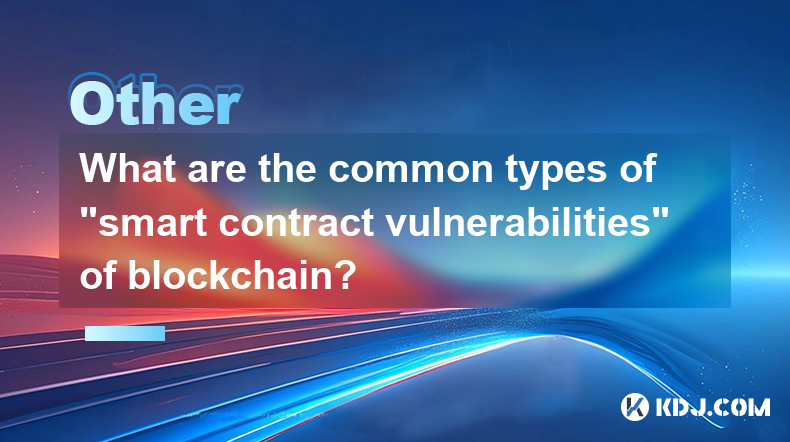
Understanding Smart Contract Vulnerabilities
Smart contracts, self-executing contracts with the terms of the agreement between buyer and seller being directly written into lines of code, are a cornerstone of blockchain technology. However, their inherent complexity introduces several vulnerabilities that can be exploited by malicious actors, leading to significant financial losses and reputational damage. Understanding these vulnerabilities is crucial for developers and users alike to ensure the security and reliability of decentralized applications (dApps).
Common Smart Contract Vulnerabilities
Several common vulnerabilities plague smart contracts. These often stem from coding errors or design flaws. Let's explore some of the most prevalent:
Reentrancy: This is arguably the most infamous vulnerability. A reentrancy attack occurs when a malicious contract calls back into the vulnerable contract before the first call completes. This allows the attacker to drain funds repeatedly. Preventing reentrancy requires careful state management and the use of checks-effects-interactions pattern.
Arithmetic Overflow/Underflow: These vulnerabilities arise from limitations in how integers are handled in programming languages. If a calculation exceeds the maximum or minimum value for a given data type, unexpected behavior occurs, often leading to unintended results, including the manipulation of balances. Using SafeMath libraries or similar secure arithmetic functions is crucial to mitigate this risk.
Gas Limit Issues: Smart contracts operate within a limited amount of computational gas. Attackers can exploit this by crafting transactions that consume excessive gas, causing the contract to fail or revert, potentially leaving the attacker with an advantage. Careful gas estimation and testing are vital to prevent gas limit exploits.
Denial of Service (DoS): DoS attacks aim to render a smart contract unusable. This can be achieved through various methods, such as flooding the contract with transactions or exploiting vulnerabilities to lock up its functionality. Robust error handling and rate limiting mechanisms can help prevent DoS attacks.
Timestamp Dependence: Some smart contracts rely on the blockchain's timestamp for critical operations. However, block timestamps can be manipulated in some cases, leading to unpredictable behavior and potential vulnerabilities. Minimizing reliance on timestamps or using alternative, more secure methods for time-sensitive operations is recommended.
Transaction Ordering Dependence: The order in which transactions are processed on the blockchain can sometimes influence the outcome of a smart contract. Attackers may try to manipulate transaction ordering to their advantage. Careful consideration of transaction ordering and its potential impact is crucial in the design phase.
Logic Errors: These are flaws in the contract's logic that can be exploited. These errors can range from simple coding mistakes to complex design flaws. Thorough code review and testing are essential to identify and correct logic errors.
Delegatecall: The
delegatecallfunction allows a contract to execute code within another contract using its own context. This can create vulnerabilities if not handled carefully, potentially allowing attackers to manipulate the contract's state. Careful consideration of the implications of delegatecall and its usage is critical.Unhandled Exceptions: If a smart contract doesn't handle exceptions properly, it can lead to unexpected behavior and vulnerabilities. Unforeseen errors can halt the execution and potentially leave the contract in an inconsistent state. Robust error handling mechanisms are needed to mitigate the risks of unhandled exceptions.
Mitigation Strategies
Several strategies can help mitigate these vulnerabilities:
Formal Verification: This involves mathematically proving the correctness of a smart contract's code.
Code Audits: Independent security audits by experienced professionals can identify and address vulnerabilities before deployment.
Bug Bounties: Offering rewards for finding and reporting vulnerabilities can incentivize security researchers to identify and report potential issues.
Testing: Thorough testing, including unit tests, integration tests, and fuzz testing, is crucial for identifying and resolving vulnerabilities.
Frequently Asked Questions
Q: What is the most common type of smart contract vulnerability?
A: Reentrancy is arguably the most prevalent and dangerous smart contract vulnerability, allowing attackers to repeatedly drain funds.
Q: How can I prevent reentrancy vulnerabilities?
A: Employ the checks-effects-interactions pattern and use appropriate state management techniques.
Q: What are SafeMath libraries?
A: SafeMath libraries are tools that prevent arithmetic overflow and underflow errors by performing checks before each arithmetic operation.
Q: What is the role of code audits in smart contract security?
A: Code audits by security professionals identify and address vulnerabilities before deployment, reducing the risk of exploitation.
Q: How can I improve the security of my smart contracts?
A: Use secure coding practices, employ formal verification techniques, conduct thorough testing, and utilize code audits and bug bounty programs.
Q: What are some examples of logic errors in smart contracts?
A: Logic errors can range from simple coding mistakes to complex design flaws that lead to unexpected behavior and vulnerabilities. These can be hard to detect without thorough testing and review.
Q: What is the significance of gas limit issues in smart contract security?
A: Attackers might create transactions consuming excessive gas, causing the contract to fail or revert, potentially leaving the attacker with an advantage or preventing legitimate users from interacting with the contract.
Q: How can I mitigate timestamp dependence vulnerabilities?
A: Minimize reliance on timestamps and explore alternative, more secure methods for time-sensitive operations within your smart contract.
Q: What are the best practices for preventing denial-of-service (DoS) attacks on smart contracts?
A: Implement robust error handling and incorporate rate-limiting mechanisms to prevent overwhelming the contract with excessive transactions.
Q: What is the importance of handling exceptions in smart contracts?
A: Proper exception handling prevents unexpected behavior and vulnerabilities that might arise from unforeseen errors. Failing to handle exceptions properly can lead to the contract being left in an inconsistent state.
Disclaimer:info@kdj.com
The information provided is not trading advice. kdj.com does not assume any responsibility for any investments made based on the information provided in this article. Cryptocurrencies are highly volatile and it is highly recommended that you invest with caution after thorough research!
If you believe that the content used on this website infringes your copyright, please contact us immediately (info@kdj.com) and we will delete it promptly.
- Grayscale Launches Two New Bitcoin ETFs: BTCC and BPI
- 2025-04-03 02:05:12
- Bitcoin (BTCUSD) Has Been on an Upward Trajectory Despite Volatility in Crypto and Traditional Markets
- 2025-04-03 02:05:12
- Ripple Integrates Its USD-Backed Stablecoin to Cross-Border Payments System
- 2025-04-03 02:00:12
- Dogecoin (DOGE) Forms Inverse H&S Pattern, Presenting Immediate Breakout Targets
- 2025-04-03 02:00:12
- Retesting the 61.8% Fibonacci Retracement Level Could Be a Defining Moment for the SOL/USD Pair
- 2025-04-03 01:55:13
- Ozak AI (OZ) Could Be the Next 1000x Gainer, Not Gold
- 2025-04-03 01:55:13
Related knowledge
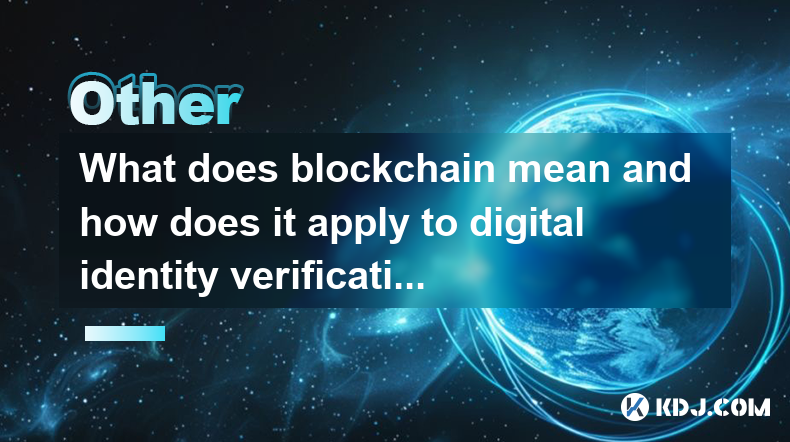
What does blockchain mean and how does it apply to digital identity verification?
Apr 03,2025 at 02:21am
Blockchain technology, at its core, is a decentralized and distributed digital ledger used to record transactions across numerous computers. This ensures that the recorded data cannot be altered retroactively without the alteration of all subsequent blocks and the consensus of the network. The concept of blockchain was initially devised for the digital ...
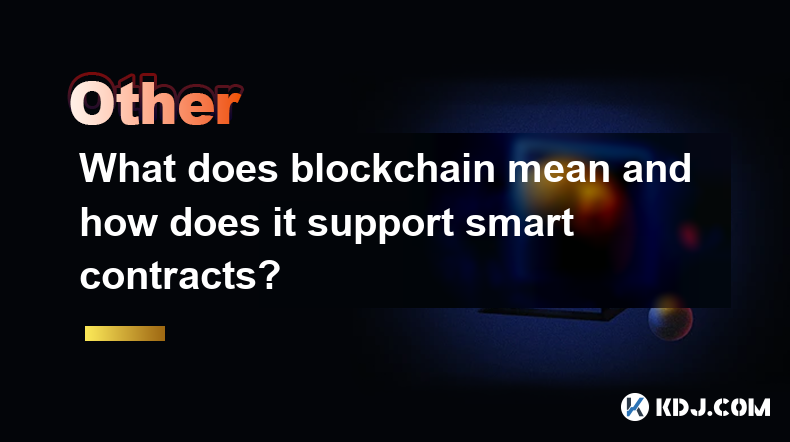
What does blockchain mean and how does it support smart contracts?
Apr 03,2025 at 02:28am
Blockchain technology is a decentralized, distributed ledger that records transactions across numerous computers. It ensures that once data is recorded, it cannot be altered retroactively without the alteration of all subsequent blocks and the consensus of the network. This technology is the backbone of cryptocurrencies like Bitcoin and Ethereum. Blockc...
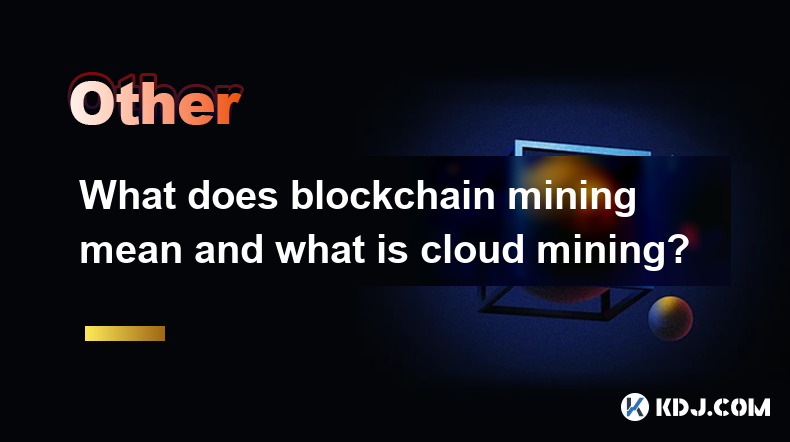
What does blockchain mining mean and what is cloud mining?
Apr 03,2025 at 02:01am
Blockchain mining is the process by which new transactions are verified and added to the blockchain ledger. It involves solving complex mathematical problems using computational power, which results in the creation of new cryptocurrency units as a reward. Miners compete to solve these problems, and the first one to find the solution gets to add a new bl...
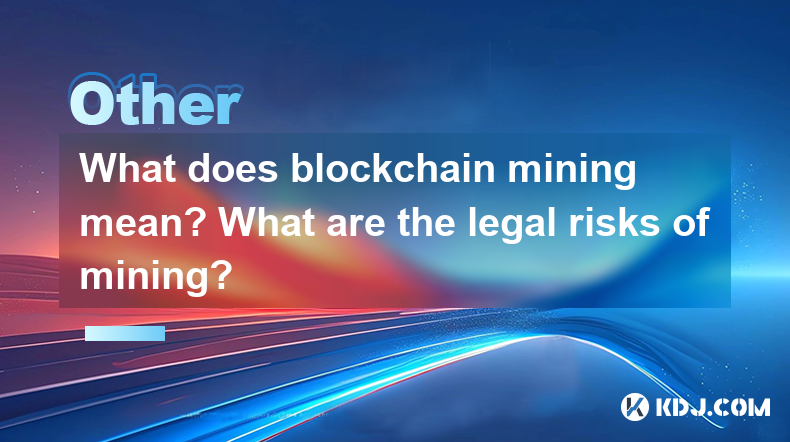
What does blockchain mining mean? What are the legal risks of mining?
Mar 31,2025 at 05:07pm
Blockchain mining is the process by which transactions are verified and added to the public ledger, known as the blockchain. Miners use powerful computers to solve complex mathematical problems, which, once solved, allow them to add a block of transactions to the blockchain. In return, miners are rewarded with cryptocurrency, typically Bitcoin. This pro...
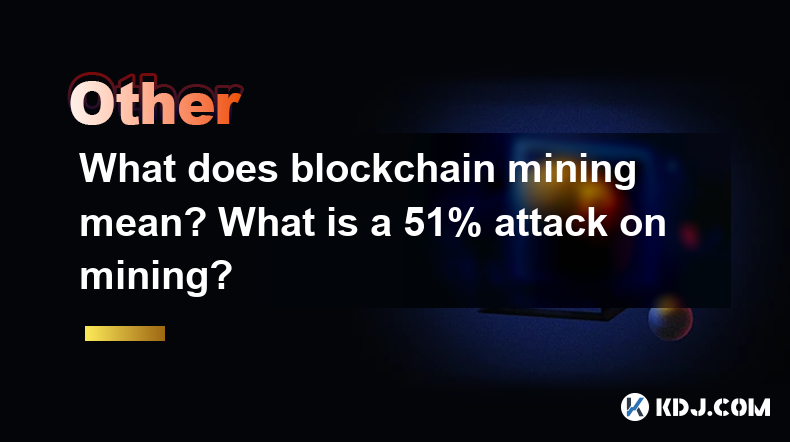
What does blockchain mining mean? What is a 51% attack on mining?
Apr 02,2025 at 03:28am
Blockchain mining is a critical process in the world of cryptocurrencies, particularly those that use proof-of-work (PoW) consensus mechanisms like Bitcoin. Mining involves using computational power to solve complex mathematical puzzles, which, when solved, validate and add new transactions to the blockchain. Miners are incentivized to participate throu...
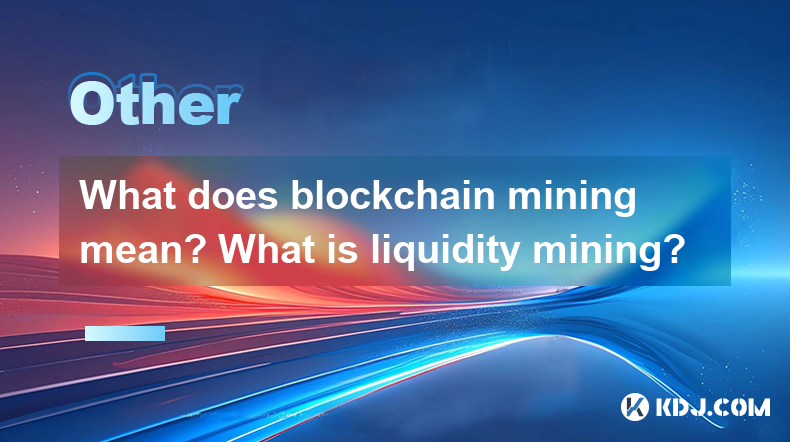
What does blockchain mining mean? What is liquidity mining?
Apr 01,2025 at 12:07am
What is Blockchain Mining?Blockchain mining is a critical process in the world of cryptocurrencies, particularly for networks like Bitcoin and Ethereum. It involves the use of computational power to solve complex mathematical problems, which in turn validates transactions and adds them to the blockchain. Miners are incentivized through rewards, typicall...

What does blockchain mean and how does it apply to digital identity verification?
Apr 03,2025 at 02:21am
Blockchain technology, at its core, is a decentralized and distributed digital ledger used to record transactions across numerous computers. This ensures that the recorded data cannot be altered retroactively without the alteration of all subsequent blocks and the consensus of the network. The concept of blockchain was initially devised for the digital ...

What does blockchain mean and how does it support smart contracts?
Apr 03,2025 at 02:28am
Blockchain technology is a decentralized, distributed ledger that records transactions across numerous computers. It ensures that once data is recorded, it cannot be altered retroactively without the alteration of all subsequent blocks and the consensus of the network. This technology is the backbone of cryptocurrencies like Bitcoin and Ethereum. Blockc...

What does blockchain mining mean and what is cloud mining?
Apr 03,2025 at 02:01am
Blockchain mining is the process by which new transactions are verified and added to the blockchain ledger. It involves solving complex mathematical problems using computational power, which results in the creation of new cryptocurrency units as a reward. Miners compete to solve these problems, and the first one to find the solution gets to add a new bl...

What does blockchain mining mean? What are the legal risks of mining?
Mar 31,2025 at 05:07pm
Blockchain mining is the process by which transactions are verified and added to the public ledger, known as the blockchain. Miners use powerful computers to solve complex mathematical problems, which, once solved, allow them to add a block of transactions to the blockchain. In return, miners are rewarded with cryptocurrency, typically Bitcoin. This pro...

What does blockchain mining mean? What is a 51% attack on mining?
Apr 02,2025 at 03:28am
Blockchain mining is a critical process in the world of cryptocurrencies, particularly those that use proof-of-work (PoW) consensus mechanisms like Bitcoin. Mining involves using computational power to solve complex mathematical puzzles, which, when solved, validate and add new transactions to the blockchain. Miners are incentivized to participate throu...

What does blockchain mining mean? What is liquidity mining?
Apr 01,2025 at 12:07am
What is Blockchain Mining?Blockchain mining is a critical process in the world of cryptocurrencies, particularly for networks like Bitcoin and Ethereum. It involves the use of computational power to solve complex mathematical problems, which in turn validates transactions and adds them to the blockchain. Miners are incentivized through rewards, typicall...
See all articles
























































































